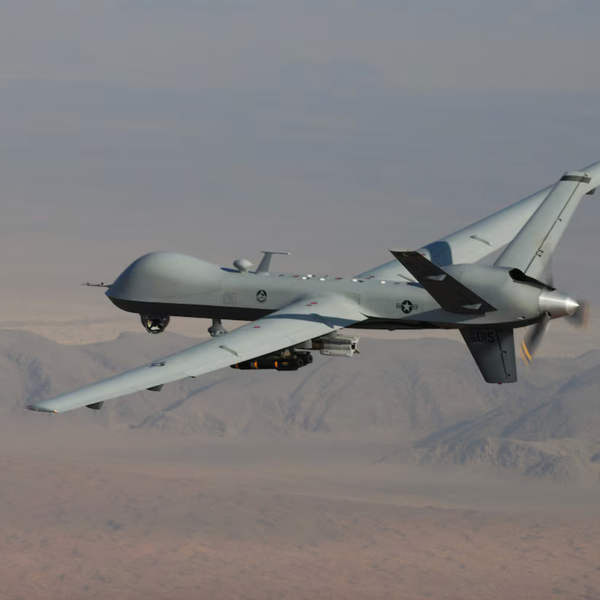Dozens Feared Dead After Gunmen Seize Hostages in Mali Hotel
At least 27 have reportedly been killed since gunmen charged the hotel in Bamako on Friday morning
At least 27 people have reportedly been killed and all other hostages freed after gunmen stormed a hotel in Mali on Friday morning.
Up to 10 armed men attacked the Radisson Blu hotel, where UN officials were holding an event, in the Malian capital of Bamako. Approximately 140 guests and 30 staff were initially captured. The hostages included American, Turkish, French, Indian, Chinese, and Guinean citizens.
Malian and international troops, including U.S. special forces, launched a counter-attack shortly after the siege began.
Al Jazeera reports that the gunmen drove up to the luxury hotel in vehicles bearing diplomatic license plates, which helped them gain easy access. According to witnesses, the gunmen spoke both in Arabic and English. Al-Mourabitoun, a group affiliated with al-Qaeda, claimed responsibility for the attack.
Attacks have spread throughout Mali this year despite a peace deal formed in June between pro-government forces and roving Tuareg rebel groups. As IRIN News explains, much of the recent violence swelled after international forces "pushed Islamist militants out of their northern strongholds in January 2013." Those forces included the French, the former colonial power in Mali.
Investigative journalist Nick Turse also noted Friday on Twitter that Mali is considered an "anti-terror bulwark," even as its U.S.-backed military was defeated by rebel forces during the January 2013 uprising, leading army officials to overthrow the democratically elected government.
As Turse wrote in a piece for TomDispatch last year:
In an effort to staunch the bleeding in [Mali and Central African Republic], the U.S. has been developing a back-to-the-future military policy in Africa--making common cause with one of the continent's former European colonial powers in a set of wars that seem to be spreading, not staunching violence and instability in the region.
[....] Washington is increasingly involved in the growing wars for West and Central Africa. And just about every move it has made in the region thus far has helped spread conflict and chaos, while contributing to African destabilization. Worse yet, no end to this process appears to be in sight. Despite building up the manpower of its African proxies and being backed by the U.S. military's logistical might, France had not completed its mission in Mali and will be keeping troops there to conduct counterrorism operations for the foreseeable future.
The humanitarian impact of the destabilization is vast. IRIN News continues:
Ongoing attacks on both local communities and in places where international aid workers live and work, has meant that an estimated 3.1 million people don't have enough to eat and that more than 410,000 Malians are in need of "immediate humanitarian assistance." In the north, where the security situation is particularly bad, rates of acute malnutrition among children under five now exceed the emergency threshold level.
This situation is still developing. The Guardian is providing live updates here.
An Urgent Message From Our Co-Founder
Dear Common Dreams reader, The U.S. is on a fast track to authoritarianism like nothing I've ever seen. Meanwhile, corporate news outlets are utterly capitulating to Trump, twisting their coverage to avoid drawing his ire while lining up to stuff cash in his pockets. That's why I believe that Common Dreams is doing the best and most consequential reporting that we've ever done. Our small but mighty team is a progressive reporting powerhouse, covering the news every day that the corporate media never will. Our mission has always been simple: To inform. To inspire. And to ignite change for the common good. Now here's the key piece that I want all our readers to understand: None of this would be possible without your financial support. That's not just some fundraising cliche. It's the absolute and literal truth. We don't accept corporate advertising and never will. We don't have a paywall because we don't think people should be blocked from critical news based on their ability to pay. Everything we do is funded by the donations of readers like you. Will you donate now to help power the nonprofit, independent reporting of Common Dreams? Thank you for being a vital member of our community. Together, we can keep independent journalism alive when it’s needed most. - Craig Brown, Co-founder |
At least 27 people have reportedly been killed and all other hostages freed after gunmen stormed a hotel in Mali on Friday morning.
Up to 10 armed men attacked the Radisson Blu hotel, where UN officials were holding an event, in the Malian capital of Bamako. Approximately 140 guests and 30 staff were initially captured. The hostages included American, Turkish, French, Indian, Chinese, and Guinean citizens.
Malian and international troops, including U.S. special forces, launched a counter-attack shortly after the siege began.
Al Jazeera reports that the gunmen drove up to the luxury hotel in vehicles bearing diplomatic license plates, which helped them gain easy access. According to witnesses, the gunmen spoke both in Arabic and English. Al-Mourabitoun, a group affiliated with al-Qaeda, claimed responsibility for the attack.
Attacks have spread throughout Mali this year despite a peace deal formed in June between pro-government forces and roving Tuareg rebel groups. As IRIN News explains, much of the recent violence swelled after international forces "pushed Islamist militants out of their northern strongholds in January 2013." Those forces included the French, the former colonial power in Mali.
Investigative journalist Nick Turse also noted Friday on Twitter that Mali is considered an "anti-terror bulwark," even as its U.S.-backed military was defeated by rebel forces during the January 2013 uprising, leading army officials to overthrow the democratically elected government.
As Turse wrote in a piece for TomDispatch last year:
In an effort to staunch the bleeding in [Mali and Central African Republic], the U.S. has been developing a back-to-the-future military policy in Africa--making common cause with one of the continent's former European colonial powers in a set of wars that seem to be spreading, not staunching violence and instability in the region.
[....] Washington is increasingly involved in the growing wars for West and Central Africa. And just about every move it has made in the region thus far has helped spread conflict and chaos, while contributing to African destabilization. Worse yet, no end to this process appears to be in sight. Despite building up the manpower of its African proxies and being backed by the U.S. military's logistical might, France had not completed its mission in Mali and will be keeping troops there to conduct counterrorism operations for the foreseeable future.
The humanitarian impact of the destabilization is vast. IRIN News continues:
Ongoing attacks on both local communities and in places where international aid workers live and work, has meant that an estimated 3.1 million people don't have enough to eat and that more than 410,000 Malians are in need of "immediate humanitarian assistance." In the north, where the security situation is particularly bad, rates of acute malnutrition among children under five now exceed the emergency threshold level.
This situation is still developing. The Guardian is providing live updates here.
At least 27 people have reportedly been killed and all other hostages freed after gunmen stormed a hotel in Mali on Friday morning.
Up to 10 armed men attacked the Radisson Blu hotel, where UN officials were holding an event, in the Malian capital of Bamako. Approximately 140 guests and 30 staff were initially captured. The hostages included American, Turkish, French, Indian, Chinese, and Guinean citizens.
Malian and international troops, including U.S. special forces, launched a counter-attack shortly after the siege began.
Al Jazeera reports that the gunmen drove up to the luxury hotel in vehicles bearing diplomatic license plates, which helped them gain easy access. According to witnesses, the gunmen spoke both in Arabic and English. Al-Mourabitoun, a group affiliated with al-Qaeda, claimed responsibility for the attack.
Attacks have spread throughout Mali this year despite a peace deal formed in June between pro-government forces and roving Tuareg rebel groups. As IRIN News explains, much of the recent violence swelled after international forces "pushed Islamist militants out of their northern strongholds in January 2013." Those forces included the French, the former colonial power in Mali.
Investigative journalist Nick Turse also noted Friday on Twitter that Mali is considered an "anti-terror bulwark," even as its U.S.-backed military was defeated by rebel forces during the January 2013 uprising, leading army officials to overthrow the democratically elected government.
As Turse wrote in a piece for TomDispatch last year:
In an effort to staunch the bleeding in [Mali and Central African Republic], the U.S. has been developing a back-to-the-future military policy in Africa--making common cause with one of the continent's former European colonial powers in a set of wars that seem to be spreading, not staunching violence and instability in the region.
[....] Washington is increasingly involved in the growing wars for West and Central Africa. And just about every move it has made in the region thus far has helped spread conflict and chaos, while contributing to African destabilization. Worse yet, no end to this process appears to be in sight. Despite building up the manpower of its African proxies and being backed by the U.S. military's logistical might, France had not completed its mission in Mali and will be keeping troops there to conduct counterrorism operations for the foreseeable future.
The humanitarian impact of the destabilization is vast. IRIN News continues:
Ongoing attacks on both local communities and in places where international aid workers live and work, has meant that an estimated 3.1 million people don't have enough to eat and that more than 410,000 Malians are in need of "immediate humanitarian assistance." In the north, where the security situation is particularly bad, rates of acute malnutrition among children under five now exceed the emergency threshold level.
This situation is still developing. The Guardian is providing live updates here.

